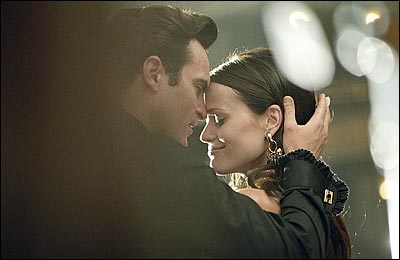
Walk the Line arrives not merely as a movie—a biopic about the music and marriage of Johnny Cash and June Carter Cash—but as a full-blown pop-cultural phenomenon; its advance media spray is impressive. You’d have to be living under Harold Bloom not to know that Joaquin Phoenix and Reese Witherspoon do their own singing; that director James Mangold got the late Johnny’s benediction to make the movie, and recorded hours of interviews with Johnny and June; that there’s early Oscar buzz, particularly for Witherspoon. The movie arrives accompanied by two recently released CD compilations and an all-star CBS special on November 16. Walk the Line is a pre-sold barn burner, approved both by Johnny and his heirs (the singer gave his blessing before his 2003 death to the casting of Phoenix; his son John Carter Cash worked closely with Mangold) and critics (I myself wrote after seeing the film at the Toronto Film Festival that they may as well give Witherspoon the Best Actress Oscar now).
So is Walk the Line that good? Yes and no. It commences spectacularly, with an explosive re-creation of Cash’s 1968 Folsom Prison concert. Phoenix gets the low, guttural sound of Cash’s speaking and singing voice down here (it wobbles unpredictably elsewhere), and the actor clearly relishes portraying an artist who took pleasure in entertaining a captive-by-law audience.
Walk the Line then backs up to the fifties, so we can follow Cash’s progression from a poor rural kid—emotionally scarred by the early death of his brother and a bad relationship with his dad (Robert Patrick)—to rockabilly hell-raiser, to neglectful husband in his first marriage, to humble suitor of June, the springy offspring of the Carter family singers. I think one reason Phoenix, for all his dedication, doesn’t come off as glowingly original as Witherspoon is that we’ve seen this sort of protagonist in just about every sort of pop-music movie, from Elvis Presley playing a convict in Jailhouse Rock to Dennis Quaid channeling Jerry Lee Lewis in Great Balls of Fire, while June Carter Cash’s kind of entertainment is relatively unknown beyond country cognoscenti.
Witherspoon, a Tennessee gal herself, knows exactly the kind of mixture of showbiz and authenticity June Carter represented in offering a grinning, polite, slightly folkier version of her elders’ God-fearing mountain music. To be sure, there was a core toughness to June—she may have been a Grand Ole Opry mainstay, but she was barely one generation from both the source-music and relative poverty—that gave even her exuberant onstage whoops the ring of conviction. Not to mention the “Ring of Fire,” a harrowing song about forbidden, agonizing love, co-written with Johnny.
This sentiment is also the center of Walk the Line, the title taken from another Cash hit. “Because you’re mine / I walk the line” is the salient couplet, compressing everything in this movie: Because Johnny wanted June so badly, and because June wouldn’t put up with any lawlessness that wasn’t stagecrafted persona, Cash began walking the line—the straight-and-narrow, crafting a stage image as the Man in Black (a color, he sang in yet another song of the same name, he associated with the downtrodden and the exploited). This is where acting trumps the script (by Mangold and Gill Dennis) and the direction. I mean, come on: Did you really expect the guy who made Cop Land and Girl, Interrupted to pull a masterpiece out of his newly bought cowboy hat? But Phoenix and Witherspoon find the emotional truths behind such standard movie moments as lovers’ quarrels that end in a kiss, or going cold turkey to shake a drug habit. Mangold downplays the Cashes’ eventual rock-ribbed religiosity for the East and West Coast markets. But if, as has been suggested, he and his studio are hoping for Coal Miner’s Daughter–size popularity, I’m guessing they’ll be disappointed, for this reason: There are too many musical performances in this movie, even for a country fan such as myself, to keep the city slickers engaged. This bespeaks great faith in the charisma of the stars, who merit it. They also, however, deserved a better script.
Walk the Line
Directed by
James Mangold.
20th Century Fox. PG-13.